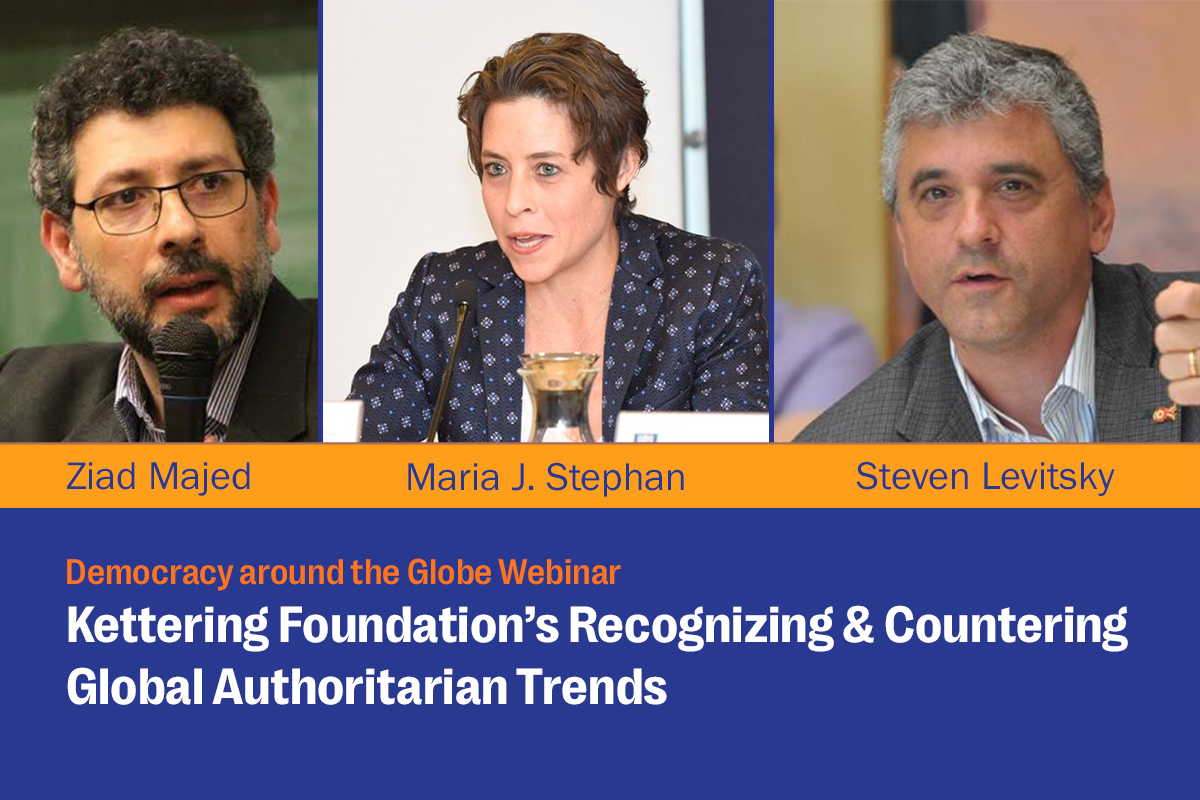News & Ideas - Confronting Authoritarianism: Insights on Protecting Democracy in a Critical Election Year

In this critical election year in which half of the population of the globe is expected to cast a ballot, concern for democracy is palpable. This year marks the 18th consecutive year of declining global freedom, according to Freedom House, and many are worried about the rise of authoritarianism in the United States and around the world.
To better understand the democratic landscape and to shed some light on the nature of the authoritarian threats, the Kettering Foundation’s Democracy around the Globe team hosted Recognizing and Countering Global Authoritarian Trends, a webinar featuring
- Steven Levitsky, David Rockefeller Professor of Latin American Studies and Professor of Government at Harvard University, coauthor of How Democracies Die and Tyranny of the Minority, and a Kettering Foundation senior fellow;
- Maria J. Stephan, colead and chief organizer for the Horizons Project, founder and former director of the program on nonviolent action for the United States Institute of Peace, former codirector of the Atlantic Council’s Future of Authoritarianism initiative, and coauthor of Why Civil Resistance Works: The Strategic Logic of Nonviolent Conflict; and
- Ziad Majed, Elliott E. Burdette Professor of Middle Eastern Studies, associate professor in the Department of History and Politics, program coordinator for Middle East pluralities at American University of Paris, and coordinator of the Arab Network for the Study of Democracy.
In her opening remarks, Kettering President and CEO Sharon L. Davies rallied the audience to pledge “not to go gently into the dark night of illiberal democracy.” Senior Program Officer for Democracy around the Globe Paloma Dallas, who moderated the conversation, asked the panelists to discuss not only the authoritarian threats and tactics being used but also to speak to what has been learned from past global movements about how to respond to these threats and strengthen democracy.
The speakers offered some important context, with Levitsky reminding the audience that the 1990s and early 2000s were a uniquely favorable time for democratic expansion. He listed the three basic things that politicians and political parties committed to democracy must do: accept the results of elections, unambiguously reject political violence, and refuse to cooperate with violent or antidemocratic forces. Then he spoke to the danger of semi-loyal democrats, those who downplay, justify, and otherwise normalize antidemocratic forces. Majed, who joined the webinar from Paris, spoke to the populist rhetoric that is on the rise, which promises easy solutions to complex problems while scapegoating immigrants, migrants, and refugees, and fueling xenophobia, racism, and sexism.
After addressing the ways that authoritarian leaders are cooperating and learning from one another, Stephan offered examples of broad-based coalitions, which are the most effective forces for countering authoritarianism. She cited examples from Chile to Brazil, and from South Africa, Poland, and the Civil Rights Movement in the US, to illustrate the ways that people have successfully challenged—and even overturned—authoritarian policies and regimes.
Referencing the parallels between the January 8, 2023, attack on Brazil’s Supreme Court, Congress, and presidential palace and the January 6, 2021, attack on the US Capitol—Levitsky enumerated the ways that the US might usefully learn from Brazil’s response, in which people from across different sectors in society stepped up to denounce the attacks and safeguard democracy. In the same vein, Majed spoke to the need for a global prodemocracy alliance. Finally, Kettering Executive Vice President and COO John Dedrick closed out the session by focusing on what people can do as citizens to counter these antidemocratic threats and create democracies that work for all of us.
You can watch the webinar, Recognizing and Countering Global Authoritarian Trends, in its entirety here. The Democracy around the Globe team will be hosting more online discussions during this pivotal election year.